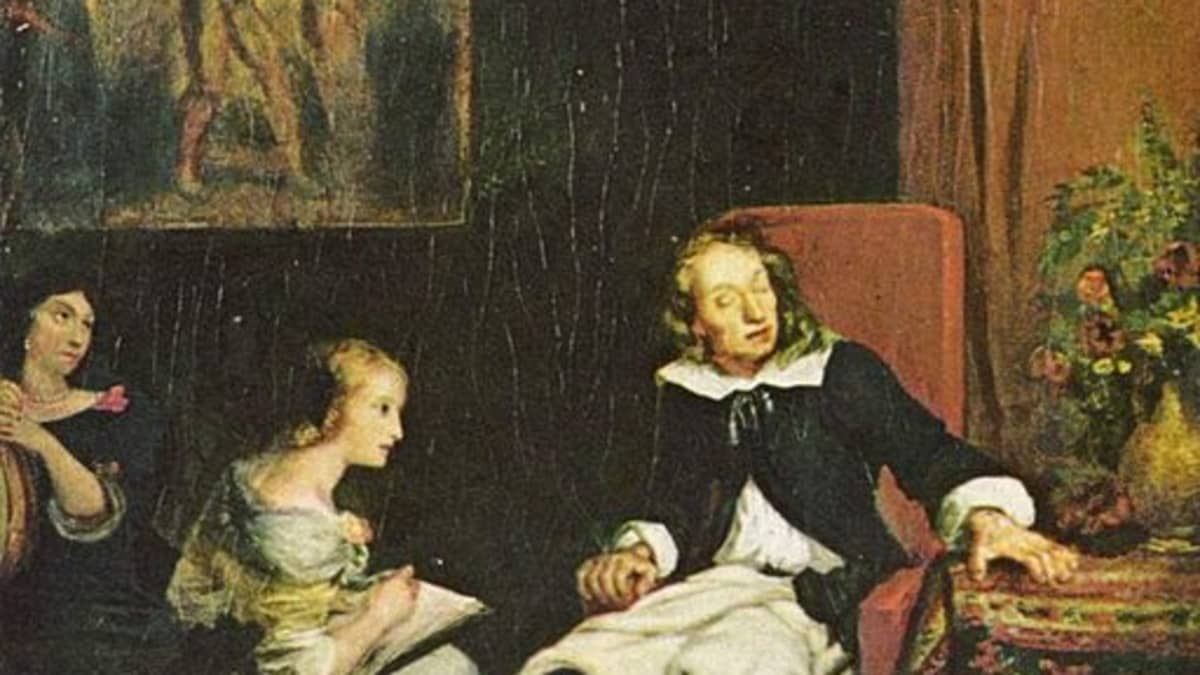Just as Henry IV, Richelieu, and Louis XIV brought greater order to French politics after the civil and religious upheavals of the sixteenth century, so the writers of the seventeenth century brought greater discipline to French writing after the Renaissance extravagance of a genius like Rabelais.
It was the age of classicism, which insisted on the observance of elaborate rules, on the authority of models from classical antiquity, and on the employment of a more polite, stylized vocabulary. In the early 1600s the example of greater refinement in manners and speech was set by the circle who met in the Paris salon (reception room) of an aristocratic hostess, the marquise de Rambouillet (1588-1665). Later, proper behavior was standardized by the court ceremonial at Versailles, and proper vocabulary by the famous dictionary of the French language that the experts of the academy founded by Richelieu finished compiling in the 1690s, after more than half a century of labor.
Nicholas Boileau (1636-1711), the chief literary critic of the day, set the rules for writing poetry with his Cartesian pronouncement, “Think well, if you wish to write well.” Exaggerated notions of propriety outlawed from polite usage the French counterparts of such terms as spit and vomit and obliged writers to seek euphemisms for dozens of commonplace activities. Indeed, many of our notions of which words are vulgar or obscene derive from this time, though they were later reinforced by Victorian prudery and class concern for “nicety” in the nineteenth century. Already there were indications of the social divisions that would produce the Revolution of 1789 in the enormous gap between the classical French speech of the court and the plainer, coarser language of the average French person.
On the other hand, the linguistic standards of the seventeenth-century court also brought substantial benefits to literature. Without its discipline, French would not have won its unique reputation for clarity and elegance. The leading tragic dramatists of le grand siecle made observance of all the classical dos and don’ts not an end in itself but a means to probe deeply into the endless variety of human personalities. Pierre Corneille (1606-1684) and Jean Racine (1639-1699) created moving portraits of people upholding exalted ideals of honor or crushed by overwhelming emotion. The French tragedies of the seventeenth century were worthy successors to the Greek dramas of the fifth century B.C., not merely because of their classical form but also because of their powerful rhetoric, complex structure, psychological insight, and clarity of expression.
As a writer of comedies, Jean Baptiste NIoliere (1622-1673). the other great French dramatist of the age, was less constrained to employ a dignified vocabulary and to heed the other rules of classicism. The main characters of his satirical comedies were not only sharply etched personalities but social types as well—the overrefined pedantic ladies of the salons, the hypocrite in 1;w:rife (1664), the ignorant and self-important newly rich in Le Bourgeois Gentilhomme (1670). In Moliere, as in all good satire, there is more than a touch of moralizing.
Didactic overtones are also present in two other characteristic works of the Great Century: the Fables of Jean de La Fontaine (1621-1695) reworked in lively fashion tales borrowed from antiquity; the Maxims of the duc de la Rochefoucauld (1613-1680) were even more disenchanted in their estimates of human nature. “Judged by most of its reactions, love is closer to hatred than to friendship.” “Men would not get on for long in society if they did not fool one another.” “In general, we give praise only that we may get it.” But la Rochefoucauld could also write, “Perfect courage means doing unwitnessed what we would be capable of with the world looking on,” and “The fame of great men should always be judged by the methods they employed to achieve it.”*
Seventeenth-century English literature also had its cynics, notably William Wycherley (c. 1640-1716), William Congreve (1670-1729), and other playwrights who wrote witty, bawdy, and disillusioned Restoration comedies. Under Charles II and his successors the pendulum of public taste and morality made a particularly violent swing as a reaction to the mid-century Puritans, who had closed down the theaters as dens of sinfulness.
One of those Puritans, John Milton, secretary of the council of state produced his major work of literature, Paradise Lost (1667), the only English epic in the grand manner that still attracts many readers, after going blind. Though Milton was a classical scholar of great learning, his often complex style and his profound belief in Christian humanism really made him a belated representative of an earlier literary age. the last great writer of the English Renaissance.
What was needed to prepare for the classical age of English letters was the modernization of the English language by pruning the elaborate flourishes, standardizing the chaotic spelling, and eliminating the long flights of rhetoric characteristic of Elizabethan and early seventeenth-century prose. lTnder the influence of John Dryden (16:31 1700), English began to model itself on French, adopting a straightforward word order. comparatively brief sentences, and the polish, nearness, and clarity of the French school. English letters were entering the Augustan Age, which lasted throw+ the first half of the eighteenth century.

